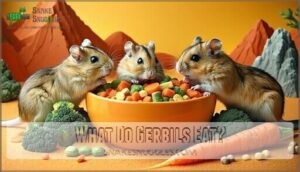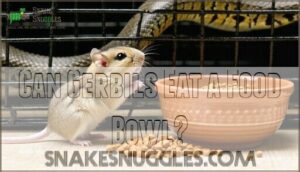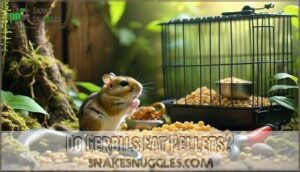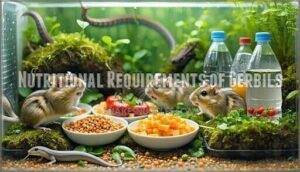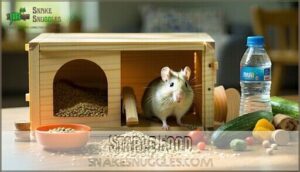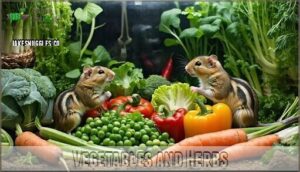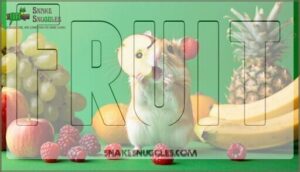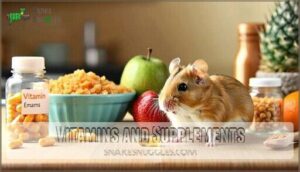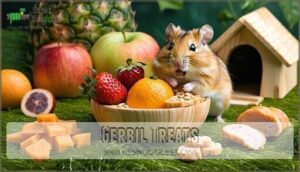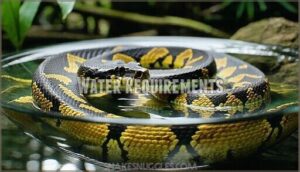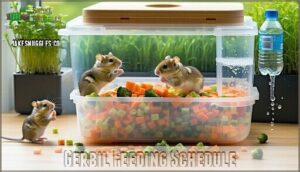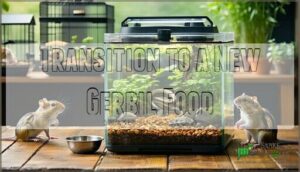This site is supported by our readers. We may earn a commission, at no cost to you, if you purchase through links.

Thaw frozen gerbils fully—nobody likes a cold dinner, not even a python. Use tongs to offer the prey, avoiding accidental nips.
Feed in a quiet spot to reduce stress; snakes prefer a drama-free meal. Never leave live gerbils unattended with your snake, as they can bite back.
Clean up leftovers quickly to keep things fresh. Feeding snakes isn’t rocket science, but a little care goes a long way—wait until you see what else matters.
Table Of Contents
- Key Takeaways
- How to Feed a Snake Gerbils?
- What Do Gerbils Eat?
- Can Gerbils Eat a Food Bowl?
- Do Gerbils Eat Pellets?
- How to Keep Gerbils Healthy?
- How Do You Properly Feed a Snake?
- Can You Feed Your Snake in Its Cage?
- Do You Have to Feed Snakes Rodents?
- What is The Best Way to Feed a Gerbil?
- Nutritional Requirements of Gerbils
- Balanced Gerbil Diet
- Frequently Asked Questions (FAQs)
- Conclusion
Key Takeaways
- Always use pre-killed, appropriately sized gerbils to keep your snake safe and avoid injuries.
- Thaw frozen gerbils completely and use tongs to offer them, protecting both you and your snake during stress-free feeding.
- Feed your snake in a quiet, stress-free spot and clean up leftovers quickly to prevent health issues.
- Mice and rats are safer, more nutritious alternatives, but if you use gerbils, make sure they’re healthy and sourced from reputable breeders.
How to Feed a Snake Gerbils?
Feeding gerbils to snakes isn’t recommended for several critical reasons. Snake feeding requires careful consideration of prey safety and nutritional value.
Gerbils aren’t the safest or most nutritious choice for your snake’s next meal.
Gerbils pose significant risks with their sharp teeth and claws that can injure your snake during prey presentation. Unlike mice or rats, gerbils aren’t natural prey items and don’t provide ideal gerbil nutrition for serpents.
Proper feeding techniques involve selecting appropriate rodent preparation methods with safer options. Mice and rats offer better nutritional profiles for snake gerbil diet considerations.
If you’re determined to use gerbils as snake food, pre-killed frozen options eliminate injury risks, though they’re harder to source than traditional snake food gerbils alternatives.
Focus on proven feeding snakes gerbils alternatives like mice, which veterinarians recommend for superior health and safety protocols.
What Do Gerbils Eat?
Understanding gerbil nutrition starts with recognizing these desert rodents as natural omnivores.
Your gerbils thrive on seeds, grains, and pellets that mirror their wild diet of grasses, roots, and occasional insects.
Commercial gerbil food provides balanced nutrition through specialized seed options and dehydrated vegetables.
Fresh vegetables like carrots, peas, and broccoli enhance their diet plans, but limit portions to prevent digestive upset.
Avoid high-fat sunflower seeds as daily staples—they’re treats, not main courses.
Quality gerbil feeding requires protein levels of 12-16% for adults, with fat content staying below 9%.
Understanding snake dietary needs when feeding gerbils to them is vital.
Whether you’re feeding gerbils to snakes or keeping them as pets, a proper gerbil diet guarantees peak nutrition and health.
Can Gerbils Eat a Food Bowl?
Despite their powerful teeth, gerbils shouldn’t eat their food bowls. These containers aren’t part of proper gerbil nutrition and can pose serious health risks if chewed or ingested.
Food Bowl Safety requires careful attention to these factors:
- Bowl Material – Choose ceramic dishes or stainless steel over plastic to prevent dangerous chewing
- Feeding Methods – Position bowls away from bathroom areas for ideal hygiene
- Size Design – Select heavy, low-sided bowls that won’t tip during gerbil feeding
- Regular Monitoring – Check for damage and replace when necessary
Your feeding snakes live gerbils setup benefits when you maintain proper snake feeding techniques alongside quality gerbil snake food preparation through safe bowl practices. Proper handling also involves understanding separate container benefits to guarantee a safe environment.
Do Gerbils Eat Pellets?
Why wouldn’t pellets work for your gerbil’s diet? Gerbil pellets absolutely belong in your pet’s meal plan. These nutrient-dense nuggets deliver balanced nutrition that seed mix alone can’t match.
When selecting pellet nutrition options, prioritize food quality over flashy packaging. Look for natural ingredients without added sugars or artificial colors. Your gerbil diet should include pellets as a foundation, not just an afterthought.
| Pellet Type | Protein Content | Best For |
|---|---|---|
| Standard Lab Blocks | 12-16% | Adult gerbils |
| High-Protein Pellets | 16-20% | Growing gerbils |
| Senior Formulas | 10-14% | Older gerbils |
| Premium Blends | 14-18% | All life stages |
Smart gerbil feeding tips suggest offering pellets alongside varied foods. Whether you’re considering gerbils for snakes or keeping them as pets, quality pellets guarantee proper nutrition. Remember, gerbil snake food requirements differ from pet care—proper snake feeding gerbil size matters for reptile health, while gerbil snake feeding focuses on nutritional density for the predator.
How to Keep Gerbils Healthy?
Keeping your gerbil healthy requires consistent attention to their gerbil nutrition and environment. A balanced diet forms the foundation of gerbil health, but it’s just the beginning.
Healthy gerbils start with good food, but thrive with clean cages, fresh water, and daily attention.
Your gerbil care tips checklist:
- Fresh water access daily – check bottles for clogs or contamination
- Healthy habitat maintenance with weekly cage cleaning and proper ventilation
- Gerbil hygiene protocols including sanitized food dishes and bedding changes
- Monitor eating patterns and weight fluctuations for early health indicators
- Veterinary checkups when appetite or behavior changes occur
This gerbil feeding guide approach prevents most health issues before they start.
How Do You Properly Feed a Snake?
Properly feeding your snake requires attention to three core elements that’ll keep your slithery friend thriving. Choose prey that’s roughly the same width as your snake’s thickest section – this prevents choking and guarantees proper digestion. Feed juveniles every 5-7 days, while adults need meals every 10-14 days depending on snake species.
Here’s your feeding roadmap:
- Thaw frozen prey completely – cold food can cause serious digestive issues
- Use feeding tongs – protects your fingers from accidental strikes
- Monitor eating behavior – healthy snakes strike quickly and swallow efficiently
Different snake species have varying dietary needs, so research your specific pet’s requirements. Using frozen-thawed prey is recommended for safety, convenience, and humane feeding practices. Frozen prey beats live options for safety reasons – no risk of your snake getting injured by defensive prey.
After feeding, avoid handling your snake for 48-72 hours to prevent regurgitation.
Can You Feed Your Snake in Its Cage?
When considering cage feeding, you’re weighing convenience against potential risks.
Feeding your snake in its enclosure offers comfort but requires careful planning.
Many owners successfully use this method with proper precautions.
| Cage Feeding Pros | Cage Feeding Cons |
|---|---|
| Reduces handling stress | Increased aggression risk |
| Familiar environment | Substrate ingestion possible |
| Simple food delivery | Snake associates cage with prey |
| Less disruption to routine | Hygiene concerns with leftovers |
| Natural feeding behavior | Potential for defensive strikes |
Monitor your snake’s stress levels during feeding sessions.
Snakes display hunger through increased tongue flicks, so watch for this behavior.
Remove any uneaten gerbils within 24 hours to prevent bacterial growth and injury risks to your pet.
Do You Have to Feed Snakes Rodents?
Rodents dominate most snake feeding regimens, but you don’t need to limit yourself to just mice and rats.
Your snake’s hunting instinct craves variety, and gerbils make excellent prey items alongside other rodents.
Different feeding methods work – frozen/thawed gerbils are safer than live options.
Rodent nutrition matters too; well-fed gerbils provide better nutrition for your snake.
While some snakes eat fish or birds, rodents remain the gold standard for balanced nutrition and practical feeding.
What is The Best Way to Feed a Gerbil?
Success hinges on mastering three core elements of gerbil nutrition. Whether you’re preparing feeder gerbils or maintaining pets, proper diet planning guarantees maximal health and nutritional value.
Here’s your gerbil feeding guide for superior results:
- Establish consistent timing – Feed once daily with measured portions (1 tablespoon per gerbil) to maintain predictable feeding schedules
- Choose quality food sources – Select commercial gerbil mixes with balanced protein levels (12-16% for adults) and avoid high-fat seeds
- Monitor intake patterns – Track consumption to detect health issues early and adjust portions accordingly
Food quality directly impacts gerbil care success. Use ceramic or stainless steel bowls positioned away from nesting areas. Fresh vegetables should comprise only 10% of total diet, offered every other days.
Snake feeding methods require healthy, well-nourished gerbils as feeders. Live gerbil feeding demands maximal nutrition beforehand – malnourished prey provides poor nutritional value. Whether scattering food for foraging or using dishes, consistency builds trust and reduces stress. Smart diet planning creates healthier gerbils, improving outcomes for both pet care and snake care gerbils applications.
Nutritional Requirements of Gerbils
Understanding your gerbil’s nutritional needs isn’t just about keeping them alive—it’s about ensuring they thrive as healthy prey for your snake.
You’ll need to provide a balanced diet that meets specific protein, fat, and carbohydrate ratios to produce nutritionally superior feeder gerbils.
Principles
Nailing the Feeding Basics means hitting the sweet spot with protein, fats, and carbs—think of it as the “three-legged stool” of Nutrition Needs.
Keep Dietary Balance front and center: protein builds muscle, fats fuel energy, and carbs keep gerbils zipping around.
Stick to these Care Principles, and you’ll master Healthy Habits for your snake feeding guide or snake diet gerbils routine.
Guidelines From Other Sources
Now that you know the basics, let’s look at what other experts say about gerbil nutrition.
Here’s a quick checklist to keep your furry friend in top shape:
- Prioritize protein for growth and muscle—think of it as their gym membership.
- Include healthy fats for energy.
- Carbs keep them zippy and active.
- Don’t skip vitamins and minerals—think of these as daily multivitamins.
Understanding the nutritional needs is essential for a balanced diet.
Follow these care guidelines for safe, happy gerbils!
Balanced Gerbil Diet
You want your gerbil to eat like a champion, not like a picky toddler at dinner.
A balanced diet means mixing the right amounts of seeds, grains, veggies, and treats—because nobody wants a chubby gerbil or a grumpy vet bill.
Staple Food
A solid staple food keeps your gerbil’s diet on track. Choose a high-quality Seed Mix and Gerbil Pellets for nutrient balance—think of it as their daily “power lunch.”
Avoid high fiber foods meant for rabbits.
Here’s a quick cheat sheet:
| Food Type | Why It Matters |
|---|---|
| Gerbil Pellets | Protein source |
| Seed Mix | Energy & variety |
| Fresh Vegetables | Occasional treat |
| High Fiber | Avoid excess |
Vegetables and Herbs
After you’ve covered staple foods, it’s time to jazz things up with vegetables and herbs.
Offer a veggie mix of peas, broccoli, carrot chunks, and leafy greens—think green foods like romaine or dandelion.
Toss in some fresh herbs for added herb benefits.
Always wash fresh vegetables and native herbs, and remove leftovers after a few hours.
Scattering veggies encourages foraging, making mealtime a little garden party!
A balanced diet may include a fresh vegetable mix for ideal nutrition.
Fruit
After veggies, let’s talk about fruit—nature’s candy for gerbils.
Fresh fruits give your pet a boost of vitamins and minerals, but moderation is key.
Here’s how to keep fruit treats both safe and tasty:
- Offer small fruit pieces like apple slices, bananas, or berries—no more than once or twice a week.
- Remove uneaten fruit after a few hours to prevent spoilage.
- Avoid citrus fruits, which can upset tiny tummies.
- Make fruit just one part of a balanced diet—too much sugar can turn your gerbil into a chubby little couch potato!
Vitamins and Supplements
After adding fruit, you might wonder if your gerbil needs extra Vitamin Needs or Mineral Supplements.
Most commercial diets meet all nutritional requirements, so skip Dietary Additives unless a vet suggests. Overdoing Health Enhancers can backfire—gerbils make their own vitamin C!
To fully understand the role of Vitamin Supplements in a balanced diet. Here’s a quick guide:
| Nutrient Boosters | Use Needed? |
|---|---|
| Vitamin C | Not required |
| Protein sources | In diet already |
The table highlights key nutrients and their necessity in a gerbil’s diet, emphasizing that Dietary Additives are generally not required, and Protein sources are already included in most commercial diets.
Gerbil Treats
In the context of gerbil treats, moderation is your best friend. Too many Nutty Delights or Gerbil Biscuits can turn your little athlete into a couch potato.
Stick to healthy snacks and follow these tips:
- Offer safe treats like Fresh Fruits, Seed Mix, or cooked chicken.
- Limit treats to a few times per week.
- Keep portions small—think “snack,” not “buffet.”
A balanced gerbil diet includes understanding gerbil food options.
Water Requirements
Even though gerbils hail from dry places, they still need fresh water daily to meet their hydration needs.
Always use a water bottle with a sipper tip or a sturdy bowl—no one likes a soggy gerbil. Check water levels every day, refresh it often, and scrub containers weekly to guarantee water quality.
Monitor drinking habits and water intake to spot health issues early. Meeting their water requirements keeps fluid balance steady and your gerbil happy—nobody wants a cranky, dehydrated roommate, and providing enough water ensures a happy gerbil.
Gerbil Feeding Schedule
After making sure your gerbils have fresh water, set up a consistent gerbil feeding schedule.
Feed once or twice daily—morning and evening work best to match their natural rhythms. Stick to about one tablespoon of food mix per gerbil each day, focusing on nutrient balance and proper food portions.
Toss in a few fresh veggies or fruits two to three times a week, but keep treats rare. Watch for leftover food and adjust as needed.
Consistent meal timing and feeding frequency keep your gerbils healthy—think of it as the secret sauce to mastering gerbil care feeding!
Transition to a New Gerbil Food
After nailing down your gerbil feeding schedule, it’s time for a new food introduction. Don’t rush—gerbils hate surprises more than you hate Mondays.
For a smooth new food switch, follow these steps:
- Mix old and new food for 10 days.
- Slowly increase new food ratio.
- Watch for digestive issues—think of it as health monitoring.
Smart, safe feeding strategies build strong nutrition plans! Understanding snake dietary needs involves considering snake food options to make certain a balanced diet.
Frequently Asked Questions (FAQs)
Can you feed a snake a gerbil?
Yes, you can feed a snake a gerbil, but always source healthy, captive-bred gerbils.
Never use wild ones—too risky!
Make sure the gerbil’s size matches your snake’s needs, think of it as portion control, reptile-style.
How do you properly feed a snake?
You’ll be a snake-feeding master, offering prey like mice or rats, frozen-thawed, in a secure, escape-proof enclosure, using feeding tongs or forceps for safety.
Are gerbils good for snakes?
Gerbils can be a suitable prey for some snakes, but you’ll want to make certain the gerbil’s diet is clean and healthy first.
Always source from reputable breeders—no one wants their snake’s dinner to come with baggage!
Can you feed pet snakes live animals?
Many reptile owners feed their ball pythons frozen-thawed rodents instead of live prey.
You can safely feed snakes live animals, but frozen-thawed options reduce injury risks and are often more convenient for handling.
What do gerbils eat?
Your gerbil thrives on commercial pellets, seed mixes, and fresh veggies like carrots and broccoli. Feed one tablespoon daily, limit fruits to occasional treats, and always provide fresh water.
Can gerbils eat a food bowl?
No, gerbils can’t eat food bowls.
You’ll want ceramic or stainless steel bowls that resist their natural chewing instincts.
Plastic bowls become dangerous snacks that can cause serious digestive blockages, so stick with chew-proof materials for safety.
Do gerbils eat pellets?
Yes, pellets form a vital part of your gerbil’s diet.
They’re specially formulated to meet nutritional needs and should comprise about 50% of their daily food intake.
Choose high-protein lab blocks to balance lower-protein seeds and fresh foods, ensuring a balanced diet for your gerbil with complete nutritional needs.
How to keep gerbils healthy?
Surprisingly, keeping these tiny desert dwellers healthy isn’t rocket science—you’ll need balanced nutrition, clean water, consistent feeding schedules, and regular vet checkups to maintain their well-being effectively.
Can you feed your snake in its cage?
Feeding your snake inside its cage is perfectly fine and actually recommended by most reptile experts.
It’s safer, reduces stress, and eliminates handling during vulnerable feeding times when snakes might bite defensively.
Do you have to feed snakes rodents?
Breaking the chains of dietary tradition, you’re not locked into feeding your snake rodents exclusively.
While rodents provide superior nutrition, snakes can eat birds, or fish, or commercially prepared frozen-thawed alternatives that meet their carnivorous needs.
Conclusion
Congratulations—you’ve mastered the ancient art of convincing a reptile to accept room service without getting sued for assault.
Learning how to feed a snake gerbils safely protects both predator and prey from unnecessary drama. You’ve discovered pre-killed gerbils eliminate bite-back risks, proper thawing prevents snake indigestion, and tongs keep your fingers attached where they belong.
Remember, feeding schedules matter more than your snake’s dramatic hunger strikes. Clean feeding areas prevent bacterial parties nobody wants to attend.
With these evidence-based protocols, you’ll maintain a healthy, well-fed snake without emergency vet visits, and following these guidelines will help you avoid emergency vet visits.

